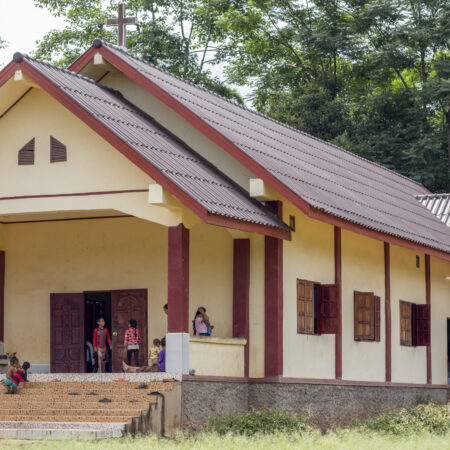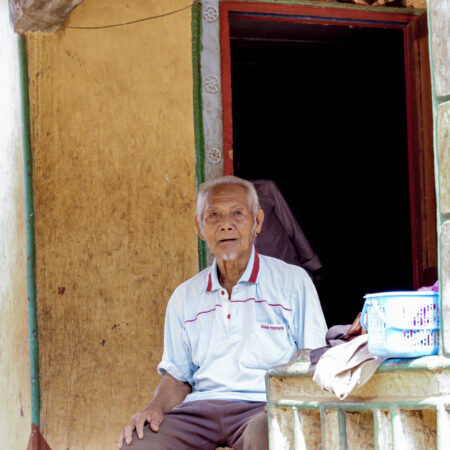“How old are you, Grandpa?” a VOM parter asked, using a traditional East Asian term of respect for elders. At age 101, Bounsaen is an elder statesman in the relatively young Laotian body of Christ. And while he can’t remember the exact date of his birth, he knows he placed his faith in Christ at age 20.
When Bounsaen came to know Christ, he was working as a witch doctor, a common occupation among animistic tribes in Laos. After memorizing a number of incantations, Bounsaen was able to earn a good living as a young witch doctor. “I was worshiping spirits,” Bounsaen said. “I was a wicked and clueless person. When people talked about Jesus, I did not like it.”
His attitude toward Christianity changed, however, when he fell in love with a Christian. “I saw her at first glance, and I wanted to marry her,” Bounsaen said with a laugh. “She wanted to marry me too.” His chosen spouse, a young woman named Term, lived in the village of Om Jun, where a large number of people had come to faith in Christ during French colonialization.
Soon after coming to faith in Christ, Bounsaen led his mother, father and several others to the Lord. “Some of the village people who were worshiping spirits got sick, and the spirits did not cure them,” he explained. “I went to pray for them, and they were healed. This opened many people’s eyes.”
Bounsaen continued to worship with Christians in Om Jun during the country’s civil war between Communist Pathet Lao insurgents and the Royal Lao Army. As the only Christian village in the province, the Om Jun Christians welcomed the encouragement, fellowship, Bibles and hymnals they received from believers in nearby Thailand.
Then came the Communists.
The 101-Year-Old Enemy of the State
The 101-Year-Old Enemy of the State
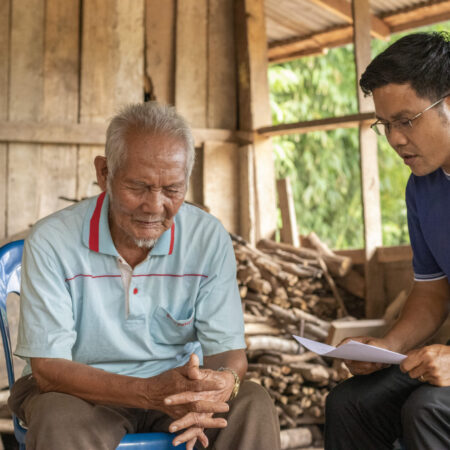
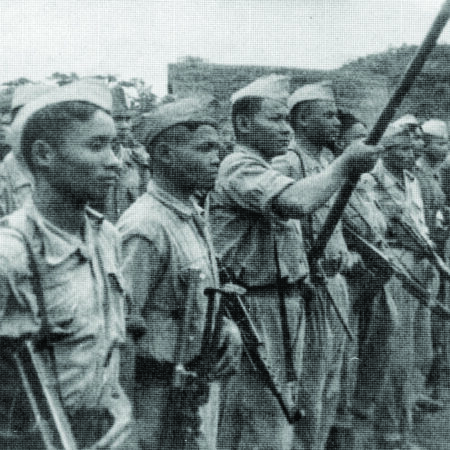
Bounsaen was conscripted into the army in the 1960s. He took his Bible and a hymnbook with him.
Imprisoned Under Communists
After the Lao Patriotic Front, the political party of the Pathet Lao, came to power in 1975, they worked to eradicate Christianity from their newly conquered country. And they saved the harshest persecution for those who had been Christians for decades. “Many people renounced their faith during that time,” Bounsaen recalled.
As a form of persecution, Bounsaen was often forced to provide manual labor on building projects, like a school. As he worked, authorities continually pressured him to abandon his faith.
Bounsaen said they hoped to get rid of him so others would also renounce their faith. “They did not want others to be like me,” he said.
Finally, in December 1980, Bounsaen was arrested and imprisoned for three months. He spent his days performing manual labor, using prayer to help him endure the hardships. “I asked the Lord for help,” he said. “Let persecution not be the reason for me to reject the Lord. May the Lord help me overcome and be victorious over this tough challenge.”
Prisoners received no blankets or clothes, and even food had to be provided by their families. When Bounsaen’s family came to deliver food, he had them write down his messages to the church. “I wanted to write those letters because I was afraid that Christians in the village would no longer have a heart for the Lord, become discouraged and eventually want to stop their faith,” he explained.
He exhorted his church to keep meeting and to stay strong. He told them he was sure he would be released soon.
“I was not scared during my time in prison,” Bounsaen said. “I was full of joy and happiness to the Lord in front of the police. I knew that the Lord would help me, because in the Bible the Lord said … ‘Do not be afraid, as the Holy Spirit will be with you and prepare you for this.’ I kept thinking like this and stood firm because of the Lord’s words.”
After about three months, authorities had had enough. They told Bounsaen that if he could complete a “seminar” on communist principles, they would release him. They thought that if they showed him the “truth,” he would change his mind. After concluding that Bounsaen had read the training material, the authorities took him before a judge and released him. “They thought I understood the seminar,” Bounsaen said with a laugh. “Why they thought that was up to them, but I stood firm in my faith.”
Bounsaen was arrested two more times during the 1980s for his work as a pastor, spending more time in prison each time.
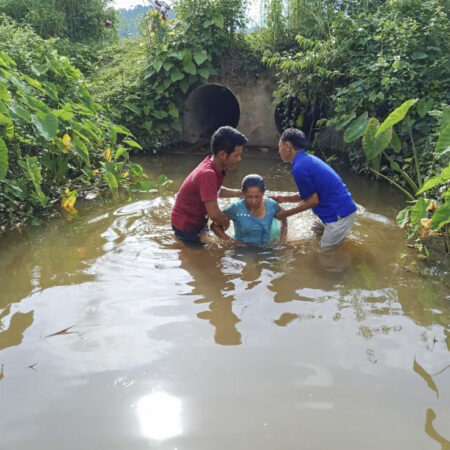
For Khmu believers, baptism symbolizes leaving traditional, animistic ancestor worship behind for a new life in Christ
Worship in the Jungle
The next decade was a time of hardship for the church in Om Jun. But as the Communists tried to close the church, Bounsaen’s message remained the same: “They can do whatever they want,” he told the congregation. “If they want to kill or keep us alive, it is up to them. We must be solid in this village. We cannot love our bodies. Our bodies will return to the land. Our spirit will be with the Lord. We have to stay solid in the Lord.”
As authorities applied more pressure, the church was forced to meet in secret. Each week, church members would leave the village at different times, carrying bags as if they were gathering food, and vary their routes to a predesignated meeting location. For regular worship they chose a location that was about a 30-minute walk from the village, but for special celebrations they traveled farther into the jungle.
“To communicate, we would not talk much face to face,” Bounsaen said, “because everyone knew the days, their role and where to go for worship. Once we gathered for worship, it was easier to announce where we would worship next and other events that would happen.
“For worship, we would gather in a circle — under a tree or anything that gave us shade,” he continued. “There were a lot of insects that bite, too! We did not have any instruments. Our instruments were just our hands for clapping. We would worship with prayer, songs and preaching.”
In late 1983, Bounsaen and several other church leaders decided to visit the governor of the province and tell him they wanted to build a church in their new village. The authorities begrudgingly approved their request. “Once we heard that,” Bounsaen said, “we built the church!”
Despite ongoing pressure from Communist authorities, the church kept growing and more people came to know Christ. “I recalled Jesus’ words, ‘For where your treasure is, there your heart will be also,’” Bounsaen said. “When I was struggling and facing a tough situation, my heart was with this church and the people. Seeing the church grow was so joyful to me. The Lord has His plans.”
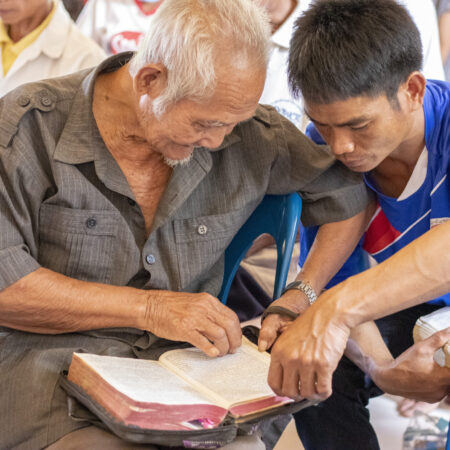
Though persecution is less intense than it was when Bounsaen was a young man, new believers are often kicked out of villages. It is important for Bounsaen to build up the faith of the younger generation.
Not too Tired
Today, the church Bounsaen led is almost 100 years old. And with more than 500 members, it is the largest church serving the Khmu ethnic group. Bounsaen no longer preaches every week, but he occasionally gives the opening prayer and continues to visit and pray for those who are sick. He requests prayer for his own health too, as he is no longer able to move around as he once did, and he also expressed concern for his family.
“Do pray for my family to be solid in the Lord,” he said. “My son-in-law does not want to go to church. His faith is getting smaller and smaller. May the Holy Spirit light a fire in his heart to come back to seek Him.” He assured his family that after he passes away, he will be in heaven, and that if they trust and love the Lord, they will join him there.
Having lived a long and fruitful life, Bounsaen eagerly anticipates something better. “I am really looking forward to the day that I am going to be with the Lord,” he said. “All my sufferings in this world will be gone. … I am looking forward to the reward He has for me, too. I wonder what kind of retirement I will get. I am getting impatient, to be honest. He has prepared a home for me.”
Bounsaen’s message for his brothers and sisters in Christ around the world reflects his love for those he has served so faithfully for more than eight decades: “Do not forget the Christians in Laos.”
